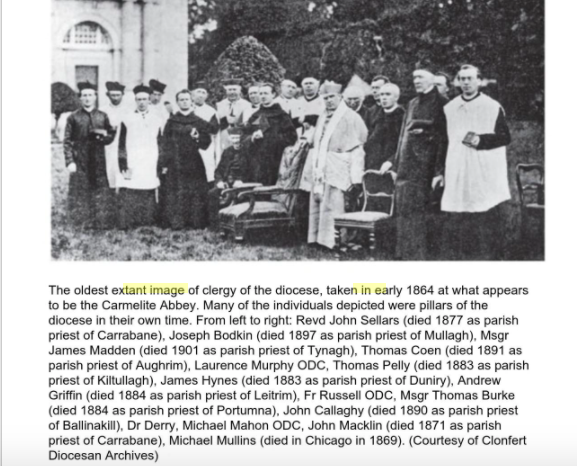Michael Mullins (1833-69)
Priest-Poet and Exile
Student 1850-57
Michael Mullins, sometimes known in later life as Mullen, was born Kilmore, Co. Galway in the diocese of Clonfert, in 1833. He entered Maynooth for service in his native diocese and, after pursuing a distinguished career, was ordained in 1856. He had already shown promise in the literary field, writing as Ollamh Fodhla in The Nation, where his poem 'The Celtic Tongue'* was published in 1854 (he was twenty-one at the time and in First Divinity) and also contributing to Duffy's 'Fireside Magazine' over the initials M.C.
In 1857, at the age of twenty-four, and as a student of the Dunboyne Institute, he took part in the concursus for the position of Professor of Theology that was ultimately won by Gerard Molloy, later rector of the Catholic University. Molloy remarks that Mullins was 'more of a poet than a theologian' and relates how he had the following exchange with another of his competitors (John Forrest) on the evening before the great event: 'I was always a great believer in athletic sports, as a help to intellectual work; and so I played cricket every day up to and during the concursus. On the evening before the day appointed for the concursus to begin, Forest came into the College, and joined some friends round the Long Walk. I was fielding at the time, and went over to bid him welcome. Seeing me in my shirtsleeves, he seemed greatly surprised, and said: 'What ! have you given up the concursus?; "Oh, no [I said] I am preparing for it!" The next day we were all busy with the Prophecy of Jacob."
Fr. Mullins seems to have continued as a pastoral priest in Clonfert, as we see from the fascinating illustration below from the History of Loughrea by Declan Kelly (Fr. Mullins is on the extreme right). He left for the United States in the year the photo was taken and was first employed in a New York diocesan seminary near Troy, where he professed Metaphysics and Moral Philosophy. He maintained his literary interests, writing for Catholic magazines such as Ave Maria and Catholic World, and, after moving to Chicago, edited the Young Catholic Guide to Chicago. After five years in exile from his homeland, he died in Chicago on April 23rd. 1869 at the age of thirty-six.


* The early lines of 'The Celtic Tongue' read
It is fading! It is fading! Like the leaves upon the trees
It is dying- ! it is dying- ! like the western ocean breeze !
It is fastly disappearing, as footprints on the shore,
Where the Barrow and the Erne, and Lough Swilly's waters roar,
Where the parting sunbeam kisses the Corrib in the West,
And the ocean like a mother clasps the Shannon to its breast;
The language of old Erin, of her history and her name
Of her monarchs and her heroes, of her glory and her fame
The sacred shrine where rested through her sunshine and her gloom,
The spirit of her martyrs as their bodies in their tomb !
The time-wrought shell where murmured, through centuries of wrong,
The secret voice of freedom in annal and in song
Is surely fastly sinking into silent death at last,
To live but in the memories and relics of the past.
Create Your Own Website With Webador